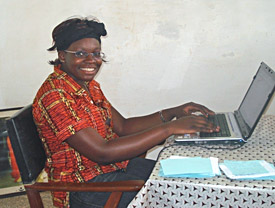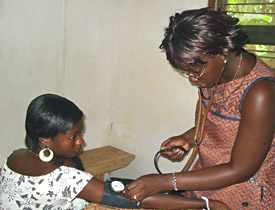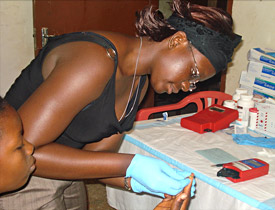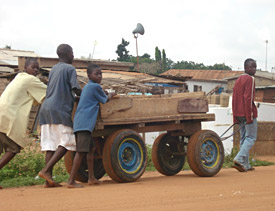On a sunny day last spring, Magbè Savané '10, a Biology major from the African nation of the Republic of Ivory Coast, was excited -- as in getting-lost–in-daydreams-during-class excited -- and with good reason. For the first time in five years, she was returning home for the summer because an anonymous sponsor provided funds for Magbè to volunteer as a nurse's aide with The WomensTrust in Pokuase, Ghana. Before her work, she would finally see her family again.

This was an opportunity Magbé had waited for the universe to deliver; when she left home no one knew a reunion would be so long in coming. Born in Yamoussoukro the third of six children, Magbè lived there until the age of eight, when her father was killed in a car accident coming home from a wedding. Her family now lives a bit farther north in Bouaké, and she misses them and the dishes that her mother used to prepare.
“When I knew I would go home this summer I couldn't believe it; I slept with it, I got up with it … I had tried to make going home a reality, but I couldn't for so long, so I was just waiting for an opportunity, and it came,” Magbè says, breathlessly.
Magbè passionately wants to become a doctor because of her own experience with illness, both as a child and as a lonely, scared patient soon after arriving in the United States for her final year of high school. For two weeks, doctors tried to figure out what was wrong as she suffered symptoms that finally led to surgery and recovery. Though undecided about her future specialty as a medical doctor, she leans toward a focus on infectious diseases and nutrition so that she can someday open a clinic in her country. Ivory Coast has a population of 20 million and an average annual income of $840. The average life span for both men and women is just under 50.
“Since I was little I have wanted to be a doctor,” Magbè says. “My philosophy is that no one should be stopped because of a lack of healthcare or education. Those are the two major things in a society that show you care, and I like the health path. There was no way I could have continued my studies in Ivory Coast, though.” In fact, even as Magbè pursues her dream with her family's support and knows her younger siblings take their cues from her, she also recognizes that the odds of them enjoying the same educational opportunities are slim to none. Since a military coup in 1999, the country has been in turmoil and gone through a civil war.

“My siblings would like to follow in my footsteps, and I think they wish they could be here because right now my country is not very stable, but there's nothing that I or they can do, so they are happy for me and pray that everything continues to go well,” says Magbè.
Through lucky timing and a family connection, Magbè left her country and came to the United States, where her network of support grew. At Colby-Sawyer, Magbè runs the Commuter Club, is a member of the Student Government senate and the Community Council, and works in the library. Last year, she volunteered in New London Hospital's Emergency Room, where she encountered injuries and ailments of all kinds. Watching the doctors and nurses work together to help their patients has been invaluable, Magbè says. During the summer of 2007, she worked with cardiologists at Massachusetts General Hospital as part of a summer program for future medical students.
“Even if you have a dream, it's hard to follow it,” says Magbè. “My friends tell me I'm crazy, that medical school is difficult and takes so long, but I say it won't hurt me to try. You will never know if you can do something if you don't try. Think big, and the opportunities will come - like this trip with WomensTrust.”
Dana Dakin, founder and president of WomensTrust, is one of the many people helping Magbe with her schooling and expenses.
“Dana knows I want to be a doctor and put me in touch with the lady who sponsored me. This is my first involvement with the trust; I have classes at the time they have their meetings so I can't attend,” Magbè says. “I really like Dana, she is a good example. She's started a healthcare program in Ghana and that is something I want to do in my home country. I acquired a good overview of the delivery of healthcare available to the women of Pokuase.”
On May 12, Magbè flew from New York to Accra, Ghana, before hopping a flight to Abidjan in neighboring Ivory Coast. From there, a six-hour bus ride returned her to her family in Bouake. On July 28, she reported to Pokuase for two weeks of weighing and vaccinating babies, monitoring blood pressure levels, diabetes, malaria and anemia, and other duties.

Using a hemoglobin meter for blood testing, Magbè found that many women had anemia, which occurs when the level of healthy red blood cells (RBCs) in the body becomes too low due to nutritional problems such as an iron or vitamin deficiency. The body needs iron to make hemoglobin, and anemia can make a person feel weak, cold, dizzy and irritable. Magbe gave the women multi-vitamins with iron, and folic acid or vitamin B 12 and encouraged them to eat a healthy, varied diet.
Over the course of five days, the clinic screened 731 women for hypertension, diabetes, and anemia, as well as providing six months of vitamins and medication for those in need.
A weekly event at the clinic is Well Baby Day, and Magbè weighed more than 200 babies in her time there. Happily, the majority were healthy. What Magbè most hoped for in Ghana was to help others, and to gain insight into what she will face in establishing her own clinic.
“I've been exposed to the medical field in the United States, but I want to be ready because it's different back home. Even though it will be years and years before I'm able to do this, it will be good to know what it is like to work with patients who didn't go to school, how to collect donations, to see the technology that is available.

Returning to campus as a senior, Magbè has a more developed sense of where she hopes her future will take her.
“I know so much more now. I didn't know much about Ghana; I didn't even know what home was like anymore,” she says. “About the clinic, I had heard it is difficult to keep track of the women and make sure they know when to go for check-ups. Most cannot read or write, and, of course, speaking with them was a problem because of the different languages, but it doesn't mean I didn't help them.
"It was challenging, but it was a good experience to see everyone working together to help people," she adds. "It was very exciting. I learned that working with individual patients is very good, but focusing on the community is very important. Based on that, I have decided not only to be a doctor, but to get my master's in public health. It doesn't make sense to treat patients if you are not familiar with the way their society runs.”
Colby-Sawyer College
541 Main Street
New London, NH 03257
(603) 526-3000
